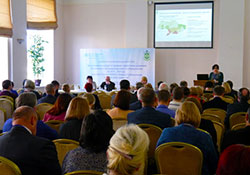Fighting tuberculosis: Ukraine develops new national TB programme for 2017-2021

WHO
On 26–27 November 2015, a roundtable to define the concept and strategic direction of the national tuberculosis (TB) programme for 2017–2021 was held in Kyiv, Ukraine. It brought together 150 TB response managers and public health decision-makers, national and international partners, and representatives of civil society and patient's organizations. Their discussion on the new national strategy for 2017–2021 was based on the global WHO End TB Strategy and the TB action plan for the WHO European Region 2016–2020.
At the roundtable, the Strategy, the new European TB action plan and the results of the most important WHO Country Office, Ukraine activities were presented and discussed with implementers from the field who work on:
- national TB programme assessment
- national anti-TB drug resistance survey (DRS) outcomes
- assessment of ambulatory TB treatment model piloting
- action plan "Patient-oriented Health Care Model in the State Penitentiary Service of Ukraine"
- operational research platform.
"Resistance to anti-TB drugs in the country is very high and it is growing. According to the results of the WHO national DRS survey, 1 in 4 new cases is multi-drug resistant. And, moreover, up to 6% of all new cases are extensively drug resistant," says Andrej Slavuckij, Medical Officer at the WHO Country Office in Ukraine, who works with TB and multidrug-resistant (MDR) TB.
Dr Pavel Georgiev, Chief Physician of Mykolaiv region's TB dispensary, says that engagement of regional health authorities from all over Ukraine in drafting the national strategy is crucial for the TB response, adding, "Thanks to WHO, we have a great opportunity for all who are involved in TB response at different levels to sit together and develop a joint strategy to fight the disease in Ukraine. During these two days, we have discussed real steps for us to provide quality services to patients and start moving to end the TB epidemic in our country."
Within the WHO Country Office initiative on TB control among internally displaced people (IDPs), Dr Natalia Klymenko, Chief Phthisiatrician of Donetsk oblast, outlined the challenging situation regarding the continuum of treatment and general case detection of patients with MDR-TB. She states, "Because of the conflict in eastern Ukraine, a huge flow of IDPs moves to other regions of the country. Jointly with the WHO Country Office in Ukraine, we established a project to support IDPs by diagnosing and treating TB. We hope this will help to control TB in the country."
At the roundtable, three working groups discussed and outlined key interventions for the new national TB programme, which were documented in the final resolution.
Background
In 2014, Ukraine was cited for the first time among the top 5 countries with the highest MDR-TB burden in the world. The TB epidemic in Ukraine is characterized by widespread MDR- and extensively drug resistant TB, a relatively high mortality rate as a result of untreated or inappropriately treated TB, and increasing TB/HIV co-infection rates.
Ukraine is currently implementing its fourth year of the 5-year national TB programme 2012–2016. 2016 will be a transition year for Ukraine to a new programme for 2017–2021. Implementation of the TB response in Ukraine has been made possible with funds provided by The Global Fund.



